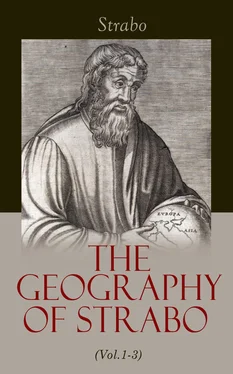Strabo - The Geography of Strabo (Vol.1-3)
Здесь есть возможность читать онлайн «Strabo - The Geography of Strabo (Vol.1-3)» — ознакомительный отрывок электронной книги совершенно бесплатно, а после прочтения отрывка купить полную версию. В некоторых случаях можно слушать аудио, скачать через торрент в формате fb2 и присутствует краткое содержание. Жанр: unrecognised, на английском языке. Описание произведения, (предисловие) а так же отзывы посетителей доступны на портале библиотеки ЛибКат.
- Название:The Geography of Strabo (Vol.1-3)
- Автор:
- Жанр:
- Год:неизвестен
- ISBN:нет данных
- Рейтинг книги:3 / 5. Голосов: 1
-
Избранное:Добавить в избранное
- Отзывы:
-
Ваша оценка:
- 60
- 1
- 2
- 3
- 4
- 5
The Geography of Strabo (Vol.1-3): краткое содержание, описание и аннотация
Предлагаем к чтению аннотацию, описание, краткое содержание или предисловие (зависит от того, что написал сам автор книги «The Geography of Strabo (Vol.1-3)»). Если вы не нашли необходимую информацию о книге — напишите в комментариях, мы постараемся отыскать её.
The Geography of Strabo (Vol.1-3) — читать онлайн ознакомительный отрывок
Ниже представлен текст книги, разбитый по страницам. Система сохранения места последней прочитанной страницы, позволяет с удобством читать онлайн бесплатно книгу «The Geography of Strabo (Vol.1-3)», без необходимости каждый раз заново искать на чём Вы остановились. Поставьте закладку, и сможете в любой момент перейти на страницу, на которой закончили чтение.
Интервал:
Закладка:
Timæus, 2015who remarks that many paradoxical accounts were related by the ancients concerning the Pithecussæ, states, nevertheless, that a little before his time, Mount Epomeus, 2016in the middle of the island, being shaken by an earthquake, vomited forth fire; and that the land between it and the coast was driven out into the sea. That the powdered soil, after being whirled on high, was poured down again upon the island in a whirlwind. That the sea retired from it to a distance of three stadia, but after remaining so for a short time it returned, and inundated the island, thus extinguishing the fire. And that the inhabitants of the continent fled at the noise, from the sea-coast, into the interior of Campania. It seems that the hot-springs 2017here are a remedy for those afflicted with gravel. Capreæ 2018anciently possessed two small cities, afterwards but one. The Neapolitans possessed this island, but having lost Pithecussæ in war, they received it again from Cæsar Augustus, giving him in exchange Capreæ. This [island] having thus become the property of that prince, he [Pg 370] [CAS. 248] has ornamented it with numerous edifices. Such then are the maritime cities of Campania, and the islands lying opposite to it.
10. In the interior is the metropolis, Capua, being, as the etymon of the name signifies, the head; for in regard to it all the other cities appear small, excepting Teanum-Sidicinum, 2019which is a very considerable place. This city lies on the Via Appia, as also the others which lead from hence to Brundusium, [viz.] Callateria, 2020Caudium, 2021and Beneventum. 2022On the side of Rome is Casilinum, 2023situated on the river Vulturnus. 2024Here 540 men of Præneste sustained against Hannibal in the height of his power so desperate a siege, that by reason of the famine, a rat 2025was sold for two hundred drachmæ, the seller dying [of hunger], but the purchaser being saved. Hannibal observing some of them sowing turnip-seed near to the wall, admired, as well he might, the patient courage of these men, who hoped to hold out in the mean while, until these turnips should be ready for food. However, we are assured that they all survived, with the exception of a few who perished either by famine or in war.
11. In addition to those just spoken of, there are these Campanian cities which we have already mentioned, viz. Cales, 2026and Teanum-Sidicinum, the limits of which are respectively marked out by the two temples of Fortune situated on either side of the Via Latina. Besides these are Suessula, 2027Atella, 2028Nola, 2029Nuceria, 2030Acerræ, 2031Abella, 2032with other smaller settlements, some of which are said to be Samnite. 2033The Samnites, by making incursions into Latium as far as Ardea, and afterwards devastating Campania itself, greatly extended their power. The Campanians, being otherwise accustomed to a despotic government, yielded ready obedience to their commands. At the present day they have been almost entirely exterminated by the various Roman generals, and last of all by Sulla, who was absolute master of the republic. He, after having by numerous battles extinguished the Italian revolt, observing that the Samnites, almost without exception, remained in one body, and with one sole intention, so that they had even marched upon Rome itself, gave them battle under the walls, and as he had issued orders to make no prisoners, many of them were cut to pieces on the field, while the remainder, said to be about three or four thousand men, who threw down their arms, were led off to the Villa Publica in the Campus Martius, and there shut in; three days after soldiers were sent in who massacred the whole; and when [Sulla] drew up his conscription list, he did not rest satisfied until he had destroyed, or driven from Italy, every one who bore a Samnite name. To those who reproached him for this animosity, he replied that he had learned by experience that not a single Roman could rest in peace so long as any of the Samnites survived. Thus their cities have now dwindled into villages, some indeed being entirely deserted, as Boianum, 2034Æsernia, 2035Panna, Telesia 2036adjoining Venafrum, and others similar, none of which can be looked upon as cities; but in a country so renowned and powerful as Italy, we thought proper to mention places even of second-rate importance. [We should add that] Beneventum 2037and Venusia 2038are still prosperous.
12. The following is the tradition concerning the [origin of the] Samnites. The Sabines having been engaged for [Pg 372]
[CAS. 250] a long period in war with the Ombrici, made a vow, common with some of the Grecian nations, that they would consecrate to the gods the productions of the year. 2039They were victorious, and accordingly of the productions, 2040the one kind were sacrificed, the other consecrated. However, in a time of scarcity, some one remarked, that they ought likewise to have consecrated the children. This then they did, and the children born at that period were called the sons of Mars. 2041When these had grown up to manhood, they were sent forth, a bull leading the way, to found a colony. The bull lay down to rest in a place belonging to the Opici; a people dwelling in villages. These they drove out, and established themselves in the place. The bull, according to the direction of the diviners, they sacrificed to Mars, who had given him to them as a leader. It seems to have been in allusion to this that their parents called them by the diminutive form of Sabelli. 2042The name of Samnites, or, as the Greeks call them, Saunites, originated in another cause. It is also said that certain Lacedæmonians came to dwell amongst them, and that this is the reason of their affection for the Greeks, and that certain of them are called Pitanatæ. 2043The whole of this, however, appears to be a mere fabrication of the Tarentini, interested in flattering and conciliating to themselves a neighbouring people, so powerful as to be able, on a time, to bring into the field a force of eighty thousand foot-soldiers, and eight thousand cavalry. There is said to be a law amongst the Samnites, excellent in itself, and calculated to excite to virtue. It is not lawful for fathers to give away their daughters to whomsoever they may please; but every year ten of the most virtuous young women, and ten of the most virtuous young men, are selected; of these the most excellent young man is married to the most excellent young woman, the second to the second, and so on in order. Should he who receives this reward, afterwards change and become wicked, he is dishonoured, and the wife who had been given is taken away from him. Beyond are the Hirpini, who are also Samnites: their name they take from the wolf, which conducted their colony; a wolf being called by the Samnites hirpos : these people border on the Leucani in the interior. So much for the Samnites.
13. The fertility of their country has been productive to the Campanians of as much evil as good. Their luxury ran to such a height, that they would invite to supper, in order to exhibit pairs of fighting gladiators, the exact number of pairs being regulated according to the distinction of the guests. When, on their voluntary submission to Hannibal, they received his soldiers into winter quarters, 2044the pleasures [of the place] rendered the men so effeminate, that Hannibal said, although conqueror, that he was in danger of the enemy, since his soldiers were returned to him women, and no longer men. When the Romans obtained the mastery, 2045they inflicted on them numerous ills, and ended by distributing their land by lot. 2046At the present day they are living in prosperity, and on friendly terms with the [Roman] colonists, and preserve their ancient reputation, both in respect to the size of their city and the numbers of their population. Beyond Campania and the Samnites, 2047and upon the Tyrrhenian Sea, dwells the nation of the Picentini. This is a small off-shoot from the Picentini who dwell near the Adriatic, and was transplanted by the Romans to the Posidoniate Gulf, 2048now called the Gulf of Pæstum. The city of Posidonia, which is built about the middle of the gulf, is called Pæstum. 2049The Sybarites [when they founded the city 2050] built the fortifications close upon the sea, but the inhabitants removed higher up. In after time 2051the Leucani seized upon the city, but in their turn were deprived of it by the Romans. 2052It is rendered unhealthy by a river 2053[Pg 374] [CAS. 251] which overflows the marshy districts in the neighbourhood. Between the Sirenussæ and Posidonia 2054is Marcina, 2055a city founded by the Tyrrheni, but inhabited by the Samnites. [To go] from thence into Pompæa, 2056through Nuceria, 2057[you cross] an isthmus of not more than 120 stadia. The Picentes extend as far as the river Silaro, 2058which separates their country on this side from ancient Leucania. 2059The water of this river is reported to possess the singular property of petrifying any plant thrown into it, preserving at the same time both the colour and form. 2060Picentia was formerly the capital of the Picentes; but they now dwell in villages, having been ejected by the Romans 2061for taking part with Hannibal. Also, instead of doing military service, it has been decreed that they shall be the public daily couriers and letter-carriers; [a penalty] which for the same cause has been likewise inflicted on the Leucani and Bruttii. To keep them in check, the Romans fortified Salernum, which is a little above the sea. The distance from the Sirenussæ to the Silaro is 260 stadia.
Читать дальшеИнтервал:
Закладка:
Похожие книги на «The Geography of Strabo (Vol.1-3)»
Представляем Вашему вниманию похожие книги на «The Geography of Strabo (Vol.1-3)» списком для выбора. Мы отобрали схожую по названию и смыслу литературу в надежде предоставить читателям больше вариантов отыскать новые, интересные, ещё непрочитанные произведения.
Обсуждение, отзывы о книге «The Geography of Strabo (Vol.1-3)» и просто собственные мнения читателей. Оставьте ваши комментарии, напишите, что Вы думаете о произведении, его смысле или главных героях. Укажите что конкретно понравилось, а что нет, и почему Вы так считаете.












![Anne Blunt - A Pilgrimage to Nejd, the Cradle of the Arab Race. Vol. 2 [of 2]](/books/750183/anne-blunt-a-pilgrimage-to-nejd-the-cradle-of-the-thumb.webp)